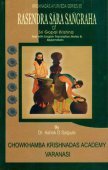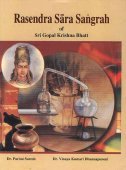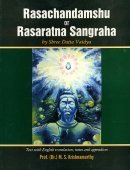Hridroga, Hṛdroga, Hrid-roga: 17 definitions
Introduction:
Hridroga means something in Hinduism, Sanskrit, Marathi, Hindi. If you want to know the exact meaning, history, etymology or English translation of this term then check out the descriptions on this page. Add your comment or reference to a book if you want to contribute to this summary article.
The Sanskrit term Hṛdroga can be transliterated into English as Hrdroga or Hridroga, using the IAST transliteration scheme (?).
In Hinduism
Ayurveda (science of life)
Kalpa (Formulas, Drug prescriptions and other Medicinal preparations)
Source: Shodhganga: Edition translation and critical study of yogasarasamgrahaHṛdroga (हृद्रोग) refers to “disease of heart” and is one of the various diseases mentioned in the 15th-century Yogasārasaṅgraha (Yogasara-saṅgraha) by Vāsudeva: an unpublished Keralite work representing an Ayurvedic compendium of medicinal recipes. The Yogasārasaṃgraha [mentioning hṛdroga] deals with entire recipes in the route of administration, and thus deals with the knowledge of pharmacy (bhaiṣajya-kalpanā) which is a branch of pharmacology (dravyaguṇa).
Rasashastra (Alchemy and Herbo-Mineral preparations)
Source: Wisdom Library: Rasa-śāstraHṛdroga (हृद्रोग) refers to “heart-diseases” according to the fifth volume of the Rasajalanidhi (chapter 6). Accordingly, “Heart-diseases (hridroga) are due to (a) eating or drinking in excess of articles which are very hot, or heavy or hitter or astringent in taste, (b) hard labour; (c) physical shock, especially received in the region of the heart; (d) taking a fresh meal before the preceding one is digested; (e) worries and mental strain; (f) and suppression of calls of nature”.
Heart-diseases (hridroga) may be due to any one of the following causes, and are, therefore, of five different kinds:—(a) abnormal excess of vayu, (b) ditto of pitta (c) ditto of kapha, (d) ditto of the three combined, and (e) worms.—In all of these diseases, the chyle is vitiated by any one or all of the three doshas and give rise to troubles in the heart (hridroga).
Unclassified Ayurveda definitions
Source: Google Books: Ṣoḍaśāṅgahṛdayam: Essentials of AyurvedaHṛdroga (हृद्रोग) refers to “cardiac disorder” and is caused by excessive intake of heavy, astringent, bitter and hot food, over-eating, exertion, psychic factors (worry, anxiety, anger etc.) and suppression of urges. Doṣas aggravated thus vitiate the rasa and being situated in heart produce the disease having symptoms according to predominance of vāta etc.
Source: archive.org: Vagbhata’s Ashtanga Hridaya Samhita (first 5 chapters)1) Hṛdroga (हृद्रोग) refers to “heart-disease”, mentioned in verse 4.15-16 of the Aṣṭāṅgahṛdayasaṃhitā (Sūtrasthāna) by Vāgbhaṭa.—Accordingly, “[...] Visceral induration, heart-disease [viz., hṛdroga], and stupor (result) from suppressed panting with fatigue. In this case relaxation (is) wholesome and the wind-destroying method of treatment”.
Note: The dvandva compound gulmahṛdrogasaṃmoha—“visceral induration, heartdisease, and stupor” has been represented somewhat incongruously by skran daṅ sñiṅ nad myos-par ’gyur, lit. “one gets sick with visceral induration and in the heart (as well as) stuporous”. Were it not for the terminative myos-par, one would rather translate: “visceral induration, heart-disease, (and) stupor are caused”.
2) Hṛdroga (हृद्रोग) can also refer to “diseases of the stomach”, as mentioned in verse 5.8-9.—Accordingly, “[...] (Those) [rivers, viz., nadī] springing from the Himavat and the Malaya, which hold water retarded by its bounding against rocks and its (consequent) dashing down and bursting asunder, (are) salutary; those, however, (which are) stagnant produce worms, elephantiasis, and diseases of the stomach [viz., hṛdroga], throat, and head; [...]”.
Source: Research Gate: Internal applications of Vatsanabha (Aconitum ferox wall)Hṛdroga (हृद्रोग) refers to “heart disease”. Vatsanābha (Aconitum ferox), although categorized as sthāvara-viṣa (vegetable poisons), has been extensively used in ayurvedic pharmacopoeia.
Source: Ancient Science of Life: Vaidyavallabha: An Authoritative Work on Ayurveda TherapeuticsHṛdroga (हृद्रोग) refers to “heart diseases”, and is dealt with in the 17th-century Vaidyavallabha (chapter 6) written by Hastiruci.—The Vaidyavallabha is a work which deals with the treatment and useful for all 8 branches of Ayurveda. The text Vaidyavallabha has been designed based on the need of the period of the author, availability of drugs during that time, disease (viz., hṛdroga) manifesting in that era, socio-economical-cultural-familial-spiritual-aspects of that period Vaidyavallabha.

Āyurveda (आयुर्वेद, ayurveda) is a branch of Indian science dealing with medicine, herbalism, taxology, anatomy, surgery, alchemy and related topics. Traditional practice of Āyurveda in ancient India dates back to at least the first millenium BC. Literature is commonly written in Sanskrit using various poetic metres.
Languages of India and abroad
Marathi-English dictionary
Source: DDSA: The Molesworth Marathi and English Dictionaryhṛdrōga (हृद्रोग).—m (S) Disease of the heart, lit. fig.; heartburn &c.; anxiety, care, sorrow, grief, regret, remorse &c.
Source: DDSA: The Aryabhusan school dictionary, Marathi-Englishhṛdrōga (हृद्रोग).—m Disease of the heart.
Marathi is an Indo-European language having over 70 million native speakers people in (predominantly) Maharashtra India. Marathi, like many other Indo-Aryan languages, evolved from early forms of Prakrit, which itself is a subset of Sanskrit, one of the most ancient languages of the world.
Sanskrit dictionary
Source: DDSA: The practical Sanskrit-English dictionaryHṛdroga (हृद्रोग).—
1) a heart-disease, heartburn.
2) sorrow, grief, anguish.
3) love.
4) the sign Aquarius of the zodiac.
Derivable forms: hṛdrogaḥ (हृद्रोगः).
Hṛdroga is a Sanskrit compound consisting of the terms hṛd and roga (रोग).
Source: Cologne Digital Sanskrit Dictionaries: Shabda-Sagara Sanskrit-English DictionaryHṛdroga (हृद्रोग).—m.
(-gaḥ) 1. Heart-burn. 2. Any disease of the heart. 3. Sorrow, grief, anguish. 4. Love. 5. The sign Aquarius of the zodiac, (in this sense more properly of Greek origin: see hradroga.) E. hṛd the heart, roga disease; also hṛdayaroga .
Source: Cologne Digital Sanskrit Dictionaries: Benfey Sanskrit-English DictionaryHṛdroga (हृद्रोग).—m. 1. any disease of the heart. 2. heart-burn. 3. sorrow,
Hṛdroga is a Sanskrit compound consisting of the terms hṛd and roga (रोग).
Source: Cologne Digital Sanskrit Dictionaries: Cappeller Sanskrit-English DictionaryHṛdroga (हृद्रोग).—[masculine] heart-disease or -grief.
Source: Cologne Digital Sanskrit Dictionaries: Monier-Williams Sanskrit-English Dictionary1) Hṛdroga (हृद्रोग):—[=hṛd-roga] [from hṛd] a m. (for hṛdroga See sub voce) idem, [Ṛg-veda; Suśruta; Varāha-mihira’s Bṛhat-saṃhitā] etc.
2) b m. ([from] [Greek] ὑδροχόος; for hṛd-roga See p. 1302, [column]2) the zodiacal sign Aquarius, [Varāha-mihira’s Bṛhat-saṃhitā]
Source: Cologne Digital Sanskrit Dictionaries: Yates Sanskrit-English DictionaryHṛdroga (हृद्रोग):—[hṛ-droga] (gaḥ) 1. m. Heartburn; any disease of the heart.
[Sanskrit to German]
Sanskrit, also spelled संस्कृतम् (saṃskṛtam), is an ancient language of India commonly seen as the grandmother of the Indo-European language family (even English!). Closely allied with Prakrit and Pali, Sanskrit is more exhaustive in both grammar and terms and has the most extensive collection of literature in the world, greatly surpassing its sister-languages Greek and Latin.
Hindi dictionary
Source: DDSA: A practical Hindi-English dictionaryHṛdroga (हृद्रोग):—(nm) heart-disease.
...
Kannada-English dictionary
Source: Alar: Kannada-English corpusHṛdrōga (ಹೃದ್ರೋಗ):—[noun] any heart-disease.
Kannada is a Dravidian language (as opposed to the Indo-European language family) mainly spoken in the southwestern region of India.
See also (Relevant definitions)
Partial matches: Hrid, Hri, Roga, Roka.
Starts with: Hridrogapratikara, Hridrogavairin.
Query error!
Full-text (+8): Hridrogavairin, Hridrogapratikara, Hridrogin, Jatharagada, Hridgada, Hradroga, Hridamaya, Utpaladi, Hridayaroga, Hridayamaya, Hridruj, Hrid, Trapvadi, Partha, Arjunabhra, Hridayarnava, Partharasa, Kalyanasundararasa, Prabhakaravati, Virupaksha.
Relevant text
Search found 28 books and stories containing Hridroga, Hṛd-roga, Hrdroga, Hṛdrōga, Hṛdroga, Hrid-roga, Hrd-roga, Hṛd-rōga, Hri-droga, Hṛ-droga, Hr-droga; (plurals include: Hridrogas, rogas, Hrdrogas, Hṛdrōgas, Hṛdrogas, rōgas, drogas). You can also click to the full overview containing English textual excerpts. Below are direct links for the most relevant articles:
Brihat Jataka by Varahamihira [Sanskrit/English] (by Michael D Neely)
Verse 1.8 < [Chapter 1 - Zodiac Signs]
International Ayurvedic Medical Journal
Concept of hridroga and its manegement in ayurveda – a review article < [2023, Issue 02, February]
A review on the role of dadima (punica granatum.linn) in hridroga chikitsa < [2022, Issue 07 July]
Management of ischemic heart disease as per ayurveda: a review < [2021, Issue 10, October]
World Journal of Pharmaceutical Research
Heart disease- an emerging lifestyle disorder and prevention in ayurveda < [2023: Volume 12, April issue 5]
Prevention of cardiovascular system {hridrog} – an ayurvedic review < [2021: Volume 10, May issue 5]
Heart disorder in ayurveda < [2021: Volume 10, October issue 12]
Ayurvedic concept of hridroga its present relevance < [Volume 12 (issue 3-4), Jan-Jun 1993]
Ancient indian bacteriology < [Volume 10 (issue 3), Jan-Mar 1991]
A critical study of the concept of iaschaemic heart disease in ayurveda < [Volume 13 (issue 1-2), Jul-Dec 1993]
Charaka Samhita (English translation) (by Shree Gulabkunverba Ayurvedic Society)
Chapter 17 - The diseases of the head (shiroroga) and of the heart (hridroga) < [Sutrasthana (Sutra Sthana) — General Principles]
Chapter 19 - The Eight Abdominal affections (udara-roga) < [Sutrasthana (Sutra Sthana) — General Principles]
Rig Veda (translation and commentary) (by H. H. Wilson)
Rig Veda 1.50.11 < [Sukta 50]
Related products





